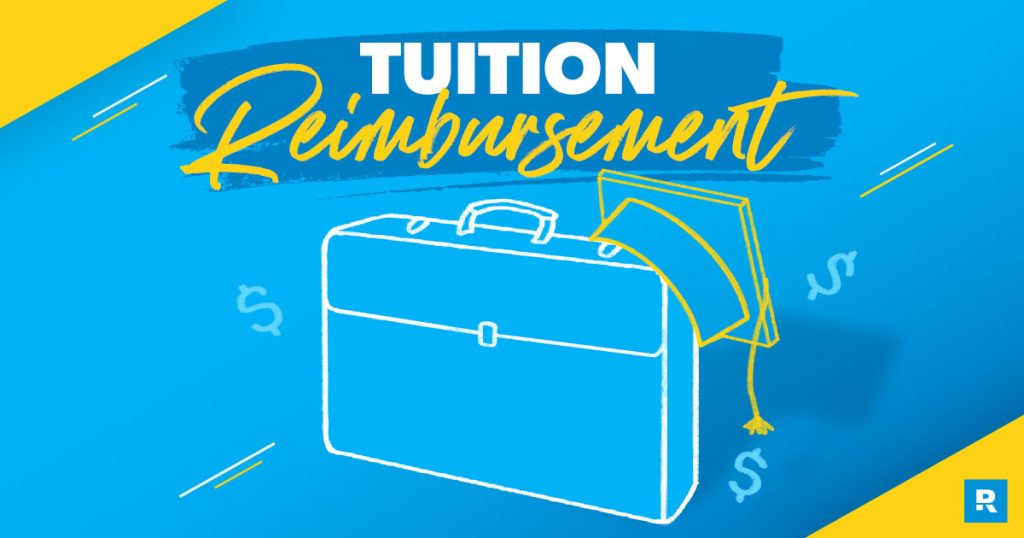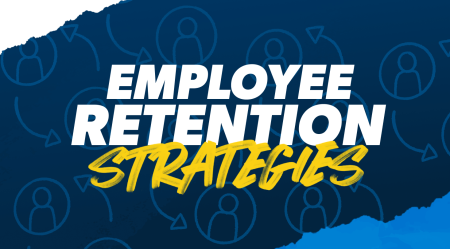Paying for college is a pain. Even worse? It’s expensive—crazy expensive. And everywhere you turn, people are trying to tell you that the only way to pay for college is with student loans. (Hint: They’re wrong.) Whether you’re 18 years old and about to dive headfirst into the real world or you’re an adult trying to continue your education, there are plenty of other ways to pay for college, like scholarships, grants and tuition reimbursements.
Never heard of that last one before? Tuition reimbursement is when the company you work for helps cover your college costs. Did your ears just perk up? We thought so. Let’s dig into everything you need to know about tuition reimbursement programs and who’s got the best ones out there.
What Is Tuition Reimbursement?
Tuition reimbursement is when an employer pays part (or even all) of your tuition for your college classes. Sometimes, people also call it “tuition assistance.” Now, don’t get this confused with college scholarships or work-study programs (where you’re enrolled in college and also have a job on campus). Tuition reimbursement usually happens when you’re already working full time and your employer wants to pay for you to continue your education. Pretty sweet deal.
How Does Tuition Reimbursement Work?
It goes a little something like this: An employee pays for their college classes (bachelor’s, graduate or continuing education), and after the semester ends, their employer will reimburse them for a portion or the full amount of the costs. Some companies will actually pay the tuition up front for you (aka you never have to pay a cent), while others make you cover the bill first and then they’ll pay you back.
Every company runs their tuition reimbursement program a little differently. That’s why you have to research the places you’re interested in and compare each program. How do you know if a company offers tuition reimbursement? Simple. Just look at the benefits they offer. Most of the time, this falls under the company’s benefits package along with health insurance, PTO and all that jazz.
Pros and Cons of Tuition Reimbursement
Pros:
- You have college paid for. Huge pro here! No more working four different odd jobs just to pay for college each semester. No more relying on Mom and Dad to make ends meet and put you through school. No more being tempted to sign up for the student loans that the guidance counselor keeps bugging you about. None. Of. That.
- Your employer is investing in you. That’s got to feel good! You’re working for a company that actually wants you to succeed and better yourself. They’ve got skin in the game since they’re investing in you. And you know what? You might just be loyal to the company and work there for a long time because of it too. Win-win for everyone.
- You’ll have more money to use for your goals. Look, we can’t see through the screen to know how your budget looks (that’d be pretty creepy), but we’re willing to bet that having college paid for would free things up in your budget. Big time. So, what could you do with some tuition assistance in your life? Get out of debt faster. Hit your emergency fund goal. Save for a house. Sounds amazing, right? Not having to foot the bill for college—or make student loan payments like (almost) everyone else—will save you major bucks.
Cons:
- You could still pay out of pocket. It’s important to read the fine print on these programs. Some of them will pay tuition costs up front, meaning they’ll cover the bill directly with your college with no money ever leaving your pocket. But some tuition assistance programs will make you pay for the semester and then they’ll reimburse you. Depending on where you are financially, having to cough up that semester’s tuition and then wait four months to be paid back can really cramp your style.
- You might have to go to a specific school or pick a certain degree. Now, this isn’t true for every tuition reimbursement plan—especially if the plan isn’t covering your full tuition costs. If an employer is only covering $1,000–2,000 a year, it might not matter what school you go to. But if they’re paying for your tuition in full, you might have to pick from their list of colleges.
And yeah, the degree you want in theater might not be covered. It’s true. Some tuition reimbursement programs will only cover specific majors that have to do with your current role at the company or that only deal with career fields the company specializes in. Again, it’s not true of all companies. But just remember to do your research here so you’re not surprised later on down the road.
- You’re sort of stuck at the job until your degree is finished. Think about it: A company might pay for your entire degree over four years—but you’d have to work there for all of that four years to get that benefit. And you know as well as we do that a lot can happen in four years. You might switch jobs and work for another company, or maybe you’ll take a different path in your career that causes you not to finish that degree at all. The point is—you don’t know what the future will hold.
Best Companies With Tuition Reimbursement Programs
Okay, these aren’t all the companies out there doing tuition assistance (a quick Google search will tell you that). Still, these are some of the most well-known companies with the best programs. Take a look for yourself:
Starbucks
Being a barista can seriously pay off. Think about all those free coffee perks! But now you can add another benefit to the list (that doesn’t have to do with caffeine)—college tuition.
OUT NOW! Watch Borrowed Future on Amazon Prime Video, AppleTV and Google Play.
Who’s eligible: Through the Starbucks College Achievement Plan, part-time and full-time benefits-eligible employees who don’t have a bachelor’s degree yet can get this benefit.1
College partner: Arizona State University2
Tuition amount covered: 100% of tuition3
Target
If you already buy everything at Target anyway, maybe it’s worth it to work there to get that discount and score some tuition reimbursement while you’re at it.
Who’s eligible: Every employee based in the United States, starting on day one of the job4
College partners: You pick! Target will reimburse tuition from over 40 colleges.5
Tuition amount covered: $5,250 a year for non-master’s program and $10,000 a year for master’s programs6
Disney
Did you wish upon a star for paid-for college? Good news—Disney heard you loud and clear.
Who’s eligible: Full-time and part-time employees in the United States who have worked for Disney for 90 days7
College partners: The Disney Aspire network works with schools like Purdue University Global, University of Denver, and University of Florida Online.8
Tuition amount covered: 100% tuition paid up front9
Bonus: They also reimburse your fees and books.
Walmart
Wearing that blue vest every day equals major green cash that gets to stay in your wallet.
Who’s eligible: Through the Live Better U program, part-time and full-time Walmart employees can get this benefit on their first day of work.10
College partners: Ten different colleges, including Johnson & Wales University, Penn Foster and Pathstream11
Tuition amount covered: 100% of college tuition and books12
Amazon
If Jeff Bezos (founder of Amazon) can afford to go to space, then you can definitely afford to go to college—on Amazon’s dime.
Who’s eligible: Employees who have worked with Amazon for one year (changing to 90 days in January 2022)13
College partners: Amazon keeps things more on the technical school side here. The Amazon Career Choice program partners with certificate and associate degree programs. But starting January 2022, Amazon’s tuition reimbursement will cover GED, English language and bachelor’s degree programs.14
Tuition amount covered: Up to 100% of tuition, textbooks, and fees—up front!15
Bonus: They offer on-site college courses in some of their fulfillment centers—making it that much easier to score that college degree.
UPS
Get off the road and into the books with this awesome benefit from UPS.
Who’s eligible: Employees on the day they’re hired16
College partners: The UPS Earn and Learn program partners with different colleges in your local area. Check with the location you’re interested in to find out more.17
Tuition amount covered: $5,250 a year (up to $25,000 total).18
Chipotle
Chips and guac might be extra—but not for you. Good thing too. You’ll need all those salty snacks while you’re up studying at night.
Who’s eligible: Hourly employees who have worked for Chipotle for at least 120 days19
College partners: The Chipotle Cultivate Education program works with colleges like Paul Quinn College, Purdue University Global and The University of Arizona.20
Tuition amount covered: 100% paid up front for certain degree programs. Plus, they cover $5,250 in tuition reimbursement for all other programs.21
Are Tuition Reimbursement Programs a Good Way to Pay for College?
Heck yeah! Look, any time you don’t take out student loans to pay for college, that’s a win in our book. And finding a company willing to give you a paycheck plus pay for your college sounds like a solid way to get after your degree. So, on paper, it sure looks like that answer is a booming yes! But be sure to look at your own situation and think through all the pros and cons for you. Keep in mind that each program is going to be different than the others, so research them all before you give it a shot.
If tuition reimbursement programs are part of your plan to pay for college, that’s great! The most important thing here is that you make a plan that doesn’t include student loans—no matter what. The student loan crisis in America has reached straight-up epidemic levels. Our brand-new documentary, Borrowed Future, is exposing that truth and trying to combat the problem in our culture. The documentary premieres October 14 on Amazon Prime Video, Apple TV and Google Play.
Read the full article here












